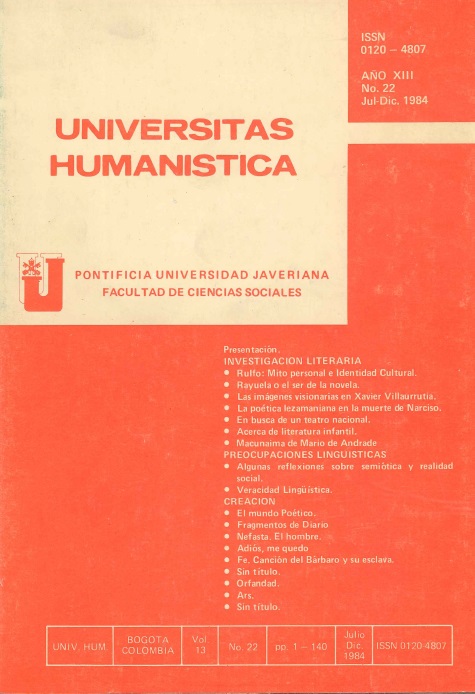Abstract
Nostalgia de la muerte (1939-19461 es un libro clave en la producción poética del escritor mexicano Xavier Villaurrutia para quien la vida es un sueño y la muerte un despertar. Pero el valor de su poesía no radica en sus afirmaciones temáticas sino en la forma artística de crear ese sentimiento de "nostalgia y de muerte". Partiendo de las teorías de Carlos Bousoño sobre el ¡nacionalismo poético, este trabajo intenta explicar cómo las imágenes visionarias en Villaurrutia tienen la función de llevar al lector del mundo de la realidad aparente al mundo subterráneo de lo órfico por medio de la emoción no sustentada en la lógica. La poesía así lograda por medio de imágenes y de metáforas insólitas hace que este integrante del grupo de "los contemporáneos", a juicio de Octavio Paz, figure en "esta exigua y exigente tradición de los heterodoxos, de los clásicos heroicos".

This journal provides immediate open access to its content on the principle that making research freely available to the public, encourages greater global exchange of knowledge.
The journal Universitas Humanística is registered under a Creative Commons Attribution 4.0 International Public License. Thus, this work may be reproduced, distributed, and publicly shared in digital format, as long as the names of the authors and Pontificia Universidad Javeriana are acknowledged. Others are allowed to quote, adapt, transform, auto-archive, republish, and create based on this material, for any purpose (even commercial ones), provided the authorship is duly acknowledged, a link to the original work is provided, and it is specified if changes have been made. Pontificia Universidad Javeriana does not hold the rights of published works and the authors are solely responsible for the contents of their works; they keep the moral, intellectual, privacy, and publicity rights.
Approving the intervention of the work (review, copy-editing, translation, layout) and the following outreach, are granted through an use license and not through an assignment of rights. This means the journal and Pontificia Universidad Javeriana cannot be held responsible for any ethical malpractice by the authors. As a consequence of the protection granted by the use license, the journal is not required to publish recantations or modify information already published, unless the errata stems from the editorial management process. Publishing contents in this journal does not generate royalties for contributors.


